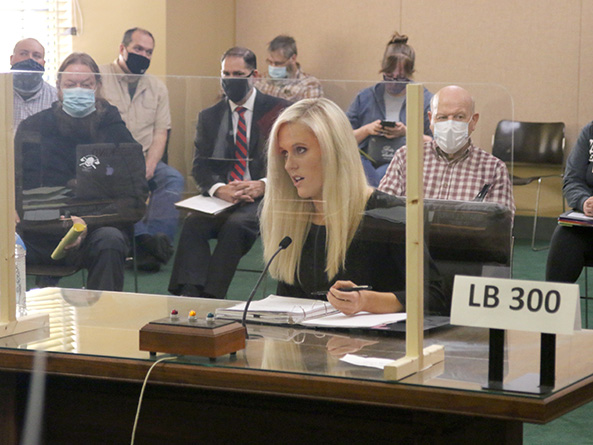Expansion of self-defense statute proposed
Members of the Judiciary Committee considered a bill March 3 meant to strengthen an individual’s right to self-defense.

Currently, the state’s “castle doctrine” permits an individual to use force to defend themselves or others in their home or workplace without retreating if there is a reasonable and good faith reason to believe that there is an immediate threat of death or serious bodily injury.
LB300, sponsored by Peru Sen. Julie Slama, would add an individual’s motor vehicle to the list of places where force could be used for self-defense.
Use of force against another individual would be authorized under the bill in cases of forced and unlawful entry into a home, workplace or motor vehicle, or a forced and unlawful abduction. The bill would provide a rebuttable presumption that an individual against whom force was used intended to commit a forceful or violent crime.
Force used to commit a criminal offense, avoid arrest or against a peace officer who identifies themself and lawfully enters a home, workplace or motor vehicle would not be protected.
Slama said the bill addresses ambiguities in state law that put county attorneys, defense attorneys and those who defend themselves in sometimes “impossible” situations.
“LB300 would protect victims from being attacked by the court after they have already been attacked by criminals in their home, their workplace or their vehicle,” she said.
The protection authorized in LB300 would not apply if the other individual had the right to be present in the home, workplace or motor vehicle, notwithstanding an active domestic violence, harassment or sexual assault protection order. Additionally, force could not be used against a parent or grandparent assuming lawful custody of a minor.
The bill also would not apply in cases when an individual has abandoned their unlawful efforts to enter a property or abduct a person.
Testifying in support of the bill was David Pringle, owner of DEGuns Firearms and Sales Service. People come to his store for help, he said, and to be enabled and empowered so that they are not dependent on the system to protect them.
“It’s so important to have clarity so that when these dynamic, critical incidents happen and unfold, the people who are involved in them — that are trying to protect themselves — can do it with certainty,” Pringle said.
James Gottschalk, vice president of the Nebraska Firearms Owners Association, also supported LB300. In cases of self-defense, he said, the onus should not be on the person defending themselves to prove that they acted responsibly, but on the state to prove that they did not.
“I transport my grandchildren on a regular basis for a variety of activities. If our safety while in that vehicle is threatened … and I can safely drive us out of danger, then I absolutely will do that,” Gottschalk said. “If, on the other hand, the threat prevents us from being able to get away, then the state should not require us to retreat from the vehicle and potentially put my grandchildren in threat of serious bodily harm or worse.”
Opposing the bill was Melody Vaccaro, speaking on behalf of Nebraskans Against Gun Violence. She said her opposition was limited to the expansion of the “castle doctrine” to include motor vehicles.
Vaccaro cited the death of Florida 15-year-old Trayvon Martin, who was shot and killed by a man who claimed that he felt threatened while inside his motor vehicle.
“Most people probably agree that you should be able to use lethal force in your home,” she said. “I think there’s probably a reasonable debate about lethal force in your workplace. But if you can drive away, you should drive away.”
The committee took no immediate action on the bill.


